You will hear it called fowl pox or avian pox, but either way, fowl pox becomes a catalyst to disease in all avian species, including the chicken. When you have a growing flock of chickens, don’t underestimate the health of your bird. You want to keep them as healthy as possible because the meat will taste better, and the bird will have a higher quality of life.
Some of the other birds susceptible to fowl pox include:
- Turkey
- Ducks
- Pheasants
- Wild birds
Fowl Pox: What You Need to Know
This disease characterizes itself through lesions on the unfeathered parts of the bird. Experts call this dry pox. When you have mucous membranes in the oral cavity, trachea or larynx, they call this wet pox.
Usually, fowl pox’s mortality rate sits between one to five percent. This depends on the severity of the disease, and you have cases where wet pox will have a much higher mortality rate.
This viral disease spreads slowly, and you have three types of fowl pox to be aware of. First, you have the fowl pox that impacts chickens and turkeys. Next, you have pigeon pox virus, and finally, you have the canarypox virus. With each viral disease, it only targets a specific species of birds. Chickens, for example, can’t catch the pigeon pox virus.
Wet and Dry Pox
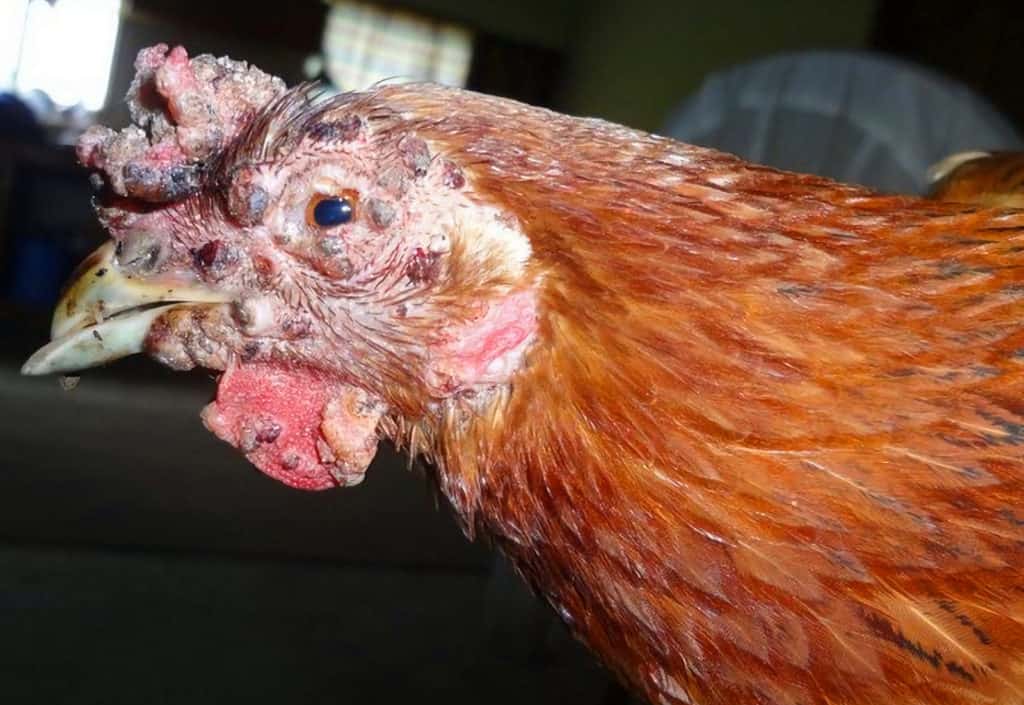
You have two forms of fowl pox: wet and dry. The dry form happens more often, and luckily, it poses fewer dangers to your chickens than wet pox, but either one can threaten your herd if you don’t handle it with care. Dry pox causes lesions to the legs, body and head in places that don’t have feathers.
While it begins as a small blister, it progresses to wart from where you will have many risks. Warts first appear as small yellow bumps, but they will continue to grow with time. As the pox lesion grows in size, it might change to a dark brown color. In particular, cases close to the eye can cause many problems.
Next, you have wet pox. Most chicken farmers consider this the deadlier form of the two. Wet pets will cause problems within the throat and the respiratory tract as white nodules. Eventually, it grows into a large mass that might even appear to be cheesy.
The danger comes from how as it grows, the chickens stop drinking water, eating food and altogether breathing. In severe cases, you can usually figure that it will result in the death of your prized birds.
You do have cases where chickens might have wet pox and dry pox at the same time. With either type of infection, it leads to a loss of appetite, and you get a lower production of eggs.
In most cases, birds that suffer from this will recover within two to four weeks, but you could see where it takes several weeks or even months for the bird to recover. Part of the reason for the slow recovery comes from how this viral infection spreads slowly throughout the pack.
Origin of Fowl Pox
Fowl Pox originates from mosquitoes that bite one of the flock. They carry this disease and introduce it to the bird. Normally, this happens because the mosquito previously fed on a chicken that had fowl pox, and this led to them being a latent carrier of the disease.f
After a mosquito feeds on a chicken with fowl pox, it will keep the disease in its salivary glands for up to eight weeks. When the mosquito bites another chicken, it spreads the illness to the uninfected chicken.
Once the chicken catches the illness, it can spread fowl pox to other members of the flock through scratches, mucous membranes and broken skin. This gets spread, and it can easily transmit to the other birds.
What Age Can Birds Catch This?
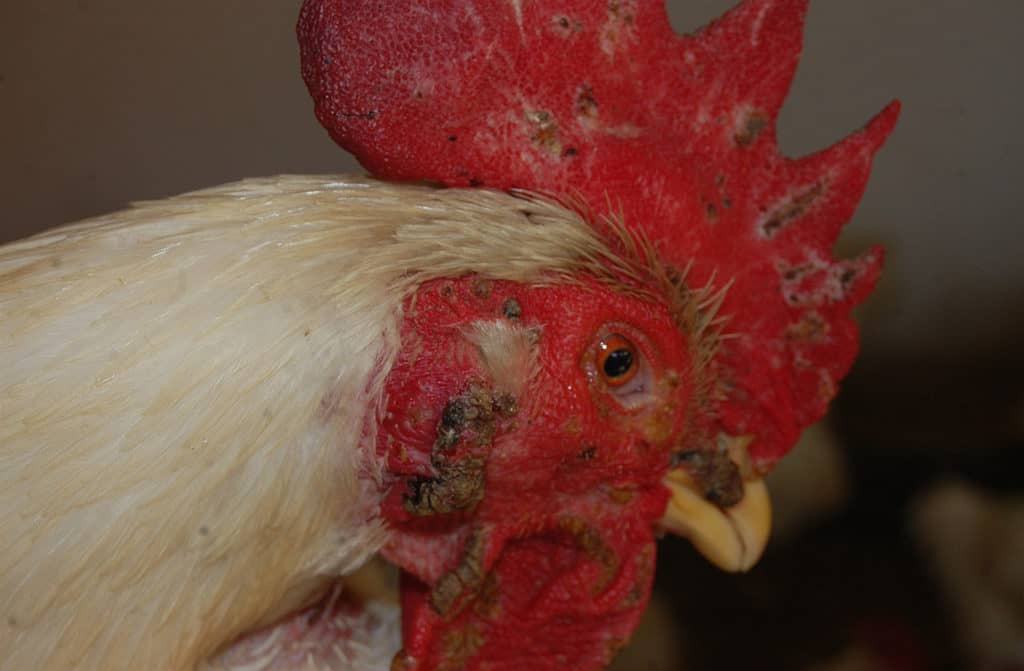
The age doesn’t matter much, and birds can catch this no matter what age they might be. Along with targeting no particular age, fowl pox can happen at any time of the year. This virus spreads around from skin dander, dried scabs and feathers.
Signs of the Disease’s Presence
- Weight loss
- Eye swelling
- Scabs and wart-like lesions
- Yellow canker lesions
- Lower water consumption
Treatment Options
While you don’t have available treatments for this disease, luckily, it doesn’t have a high mortality rate. If you want to control this disease from causing an outbreak among your chickens, you might vaccinate them to it.
You have several pox vaccines available for birds. Because this virus doesn’t spread quickly, you can typically still vaccinate your chickens even if 20 percent of the flock exhibits signs that they might have this disease.
The Good, the Bad and the Ugly
Your birds will contract fowl pox, and they will never experience the second case of it again that’s good. You might consider it like chicken pox with humans. Lower the risk through vaccinating them.
The bad is that fowl pox can and will return to the flock and infect those that may not have had it previously. This can be an ongoing problem that you hope you never have to go through again.
The ugly comes from how as your bird catches this disease, they will be vulnerable to secondary infections that can worsen the condition of your flock. They could get the cutaneous or systemic infections. You can handle the dry form relatively easily, but if your flock contracts the wet form, it can be more difficult for them to manage.
How Do You Care for Birds with a Pox Infection?
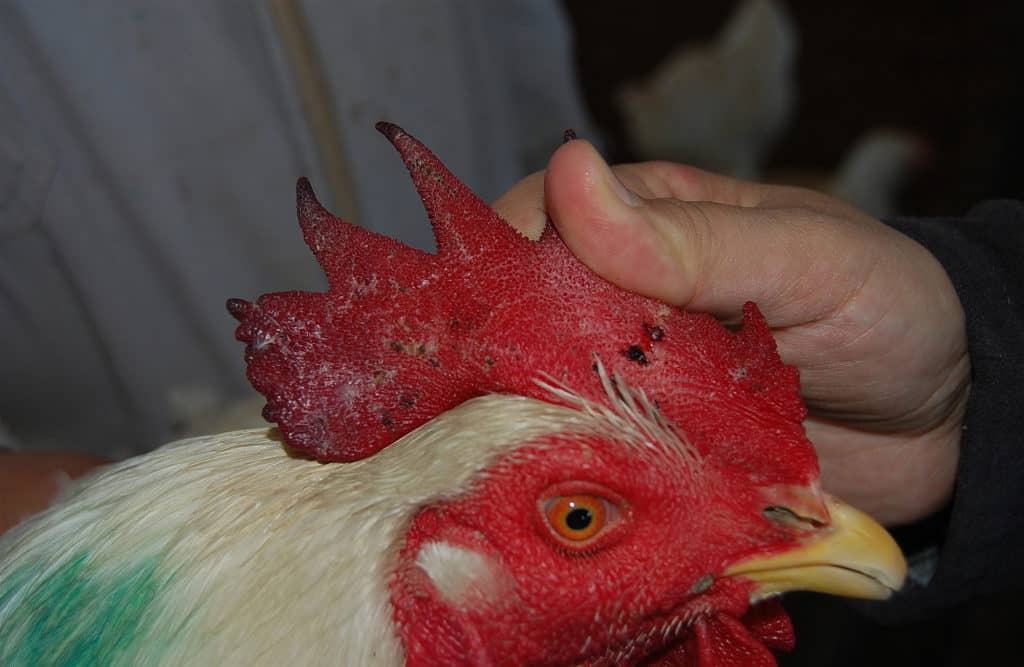
Once fowl pox infects your birds, you need to reinforce their immune systems. A stronger immune system can help them to fight the infection and to stay healthier for longer. You might give your birds vitamins to strengthen their immune system.
Some of the common vitamins given include Vitamin E, Vitamin D and Vitamin A. These oil vitamins will work best when you give it to them in liquid form.
You won’t pay much for vitamins, and it goes a long way to protecting the flock.
Can This Spread to Humans?
Luckily, fowl pox can’t spread to humans. The pox found in humans happens because of a different virus. Nevertheless, the virus could still be brought to your birds through the virus is on your equipment or your shoes.
You should always wash your hands thoroughly after you have handled your birds, and you need to sanitize your equipment as well. Usually, this virus will have an incubation period of between four to 14 days before it fully manifests.
Conditions Rife with This Virus
In particular, this virus will have an increased chance of happening when you have flocks enclosed to a small area. Either that or the large and unsanitary commercial settings have become an equally dangerous breeding ground for this type of virus.
In some cases, however, you can’t avoid it because of how your flock needs to stay inside for the winter. That becomes another risk, but you can’t do much about it. Any birds that might have fowl pox should be put on quarantine to prevent its spread to other birds. While this virus spreads slowly, you want to do what you can to contain the infection.
How Would a Veterinarian Handle It?
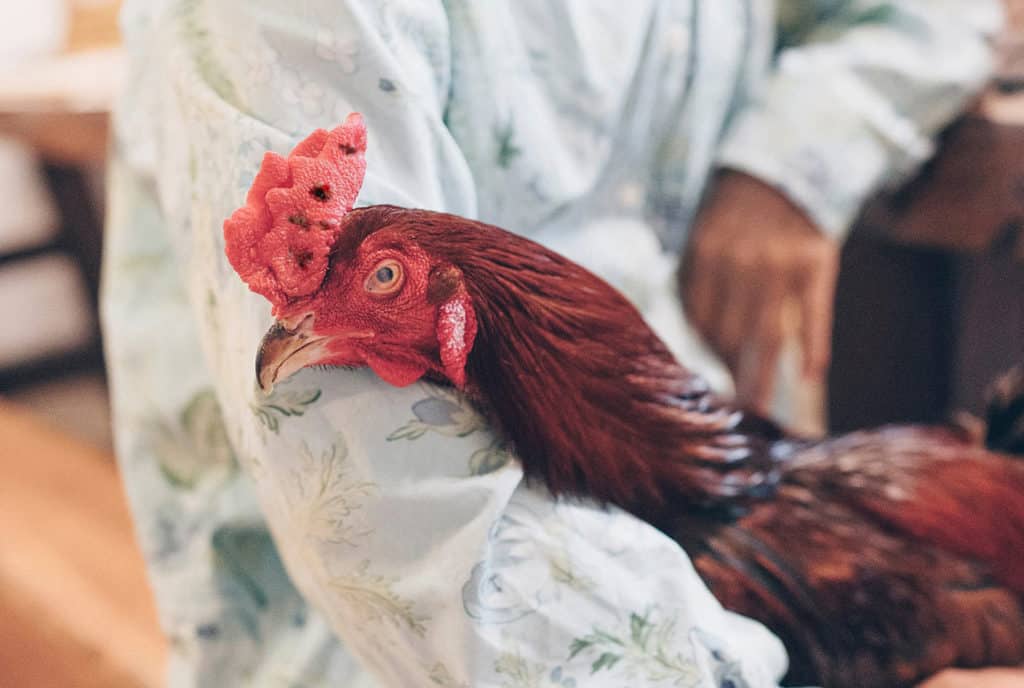
Veterinarians will usually prescribe antibiotics to deal with this illness. This helps to defend the bird from secondary illnesses as it recovers from the initial disease. No medication exists for the fowl pox virus because you technically can’t treat viruses, but the vet will put its primary attention on helping to keep it from harming the bird.
Prevent It
As the saying goes, an ounce of prevention is better than a pound of the cure. To prevent it, you might take proactive measures to vaccinate your chickens for fowl pox. You want to do whatever you can to wage war against insect pests.
For example, you might spray the area to kill off the mosquitoes. In this way, you lower the risk that one of your chickens will get bitten with fowl pox. After it has happened, you can’t do much other than wait it out.
Summary
In general, if you want to prevent fowl pox from ever taking hold of your flock, you need to check your chickens for it. Do what you can to keep it from happening. Treat any abnormalities that you notice as quickly as possible because this will keep your flock in the healthiest condition possible.
Luckily, this virus isn’t the worst one that your chickens can get. The most dangerous include Marek’s disease, Infectious Coryza and Coccidiosis. Still, you want to take active measures against fowl pox because it can still cause a lot of harm to your chickens.

Joseph Hudson has been raising chickens for over 15 years. In 2018, he completed the Agriculture & Natural Resources program at Mt. San Antonio College. He currently raises over 1400 chickens on his 7.5-hectare farm. He keeps sharing his experience on raising healthy and happy chickens on Chicken Scratch The Foundry.
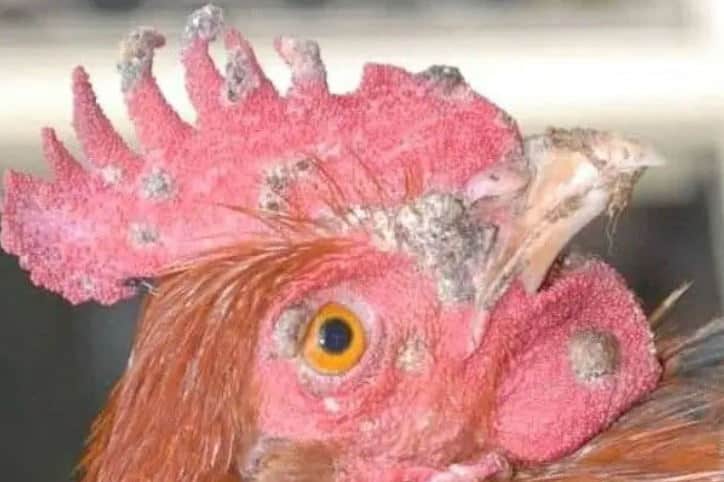
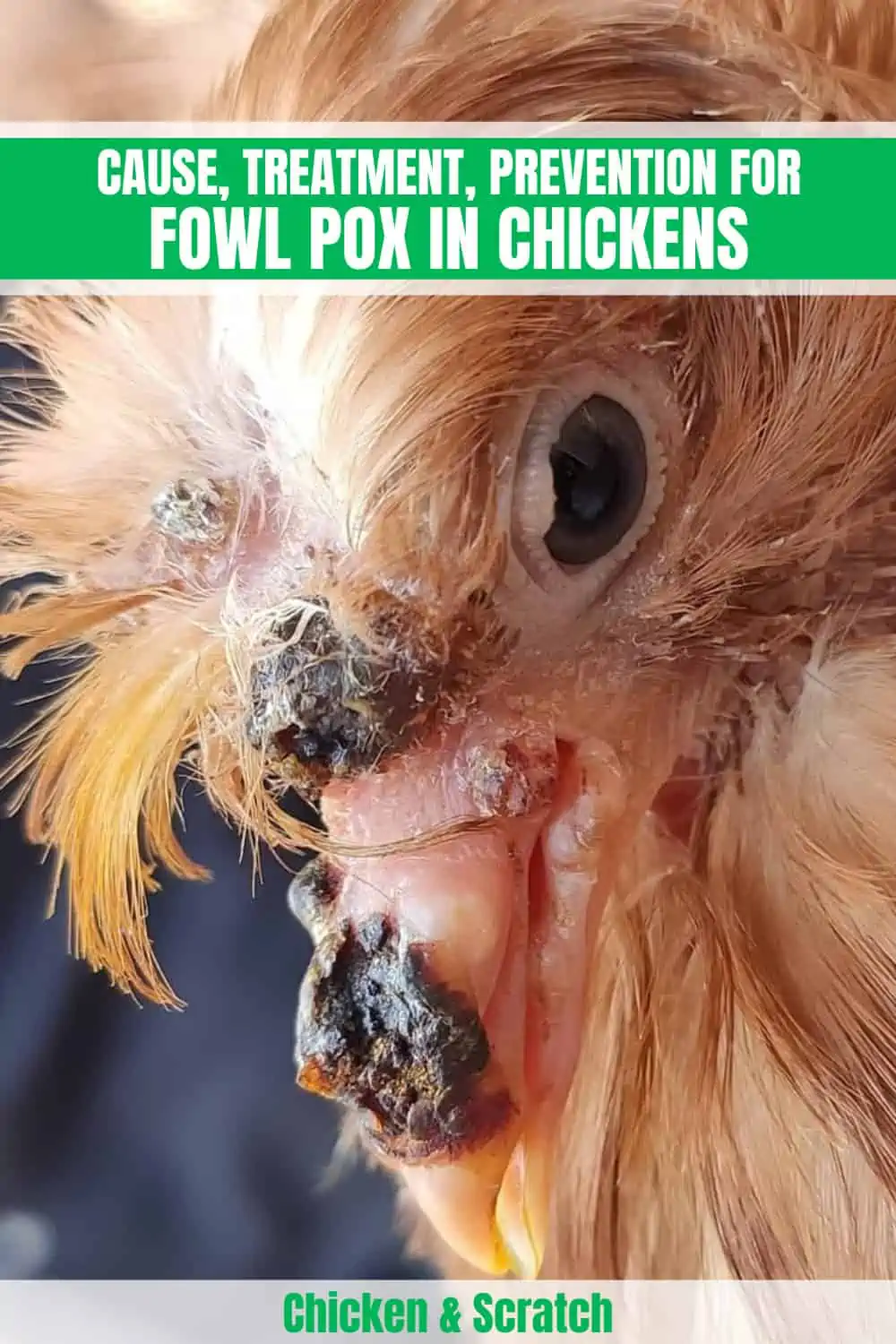







I have one chicken who I think has dry fowl pox. It has attacked her head. I have isolated her and not knowing what her problem was I put power on her feathers and a small amount of vaseline on her head. I have liquid vitamin E, do I give it to her in her water or in her mouth? She is a Death Layer a friend of mine gave to me so I do not know if she has had a shot.
Question: where do you get vit. E? Is it the human kind, like the little liquid pills? How much & how often?
put vitamin E in the water or even better buy a bag of medicaided chicken feed or starter feed. that has vitamin E and other immune boosters in it already.
Also treat your water with liquid iodine to ward off mosquitoes.
Remember, mosquitoes are the chickens worst enemy next to flies.
invest in mosquito nets or mosquito repellent granules you can shake around the pen in piles and spread around their nesting areas. Use permethrin 10 (half water half permethrin 10) or Gordon’s fly spray at tractor supply and spray it all over the place (except on food or water) and let it dry. Mosquitos are the worst problem though. They are responsible for pox and all kinds of other viruses and things chickens get. Use fence hanging waters and not ones you set on the ground. large standing water that attracts flies will attract mosquitoes.
What is the treatment for Fowl pox?
Did you read the article?
dry fowl pox goes away in a few weeks. sometimes it’s bad if your chickens are already unhealthy or eating bad food or in dirty conditions.
and don’t believe these websites that claim once they get it they’re immune to getting it again. Often times it does come back, even a 3rd or 4th time to the same chicken. There is major conflicting evidence in this claim I see on websites claiming they can’t get it again. some websites DO know they get it more than once or can get it more than once. best way to protect them is keeping mosquitoes and flies away and learning about what attracts them. use sand in a chicken pen. not wood chips or hay. these attract bugs. sand does not. sand has many more benefits than negatives.
Thanks for this article. It has really opened up my mind. Just noticed that my chicks have fowl pox.
Very useful information on the best practices for chicken care.
Grateful.
Most of my chicken are infected with chicken fowl virus, I initially didnt know diseases it was? Im glad today that through this platform I now know what cause this diseases.As I was suspecting the diseases could be spread by Mice and mosqitoes,however I was not sure? to cure it I applied “seal oil” trying to find if it can treat the diseases.Some I applied elephant dung ash,trying to find the effect of both remedy
What is the dosage for each bird of the oils? Or specifics on the oils for safe administering. Thank you
Thanks for the Article. Some of it I knew but not all of it. I Appreciate your Effort.
One of my girls started with dry pox, now progressed to wet. I feel so bad for her. She seems miserable. I was, honestly thinking of euthanizing her, but there seems to still be hope, albeit small. She is pretty sickly.
Hi Cynthia,
I’m really sorry to hear about your chicken. Fowl Pox can be tough, but remember, it’s not always a death sentence. Have you consulted with a vet experienced in poultry diseases? They could provide personalized advice based on your chicken’s condition.
Even in its severe form, chickens can recover with good nutrition, hydration, and proper care. If she isn’t eating or drinking, she may need your assistance.
Euthanizing is indeed a difficult decision and should be the last resort. If you feel she is suffering without improvement, it might be the most compassionate choice. But, do explore all potential treatment options first.
Don’t forget to prevent the disease from spreading to your other birds. Fowl Pox is highly contagious and can quickly affect your entire flock.
I wish you and your chicken the best. It’s clear you care deeply about her, and whatever decision you make will be in her best interest.